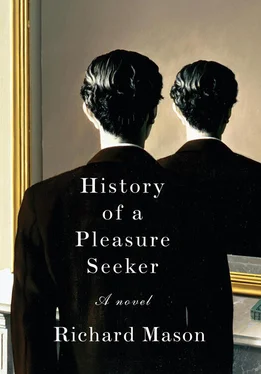“Tell her her son loves her and venerates her.” Piet’s lips followed Lauriac’s as they sang. “He repents today.”
The bright figures on the stage sparkled and lost their distinctness. Stacey Meadows turned from Don José, her eyes on Piet’s — and deep within his mourning was the exhilarating knowledge that the woman on the stage was not his mother. Indeed, she was just the sort of messenger Nina would have chosen. He looked back unflinchingly, and it was as though they sang of cherished memories to each other, and for each other alone.
Didier watched this exchange and found it highly arousing. That the man he loved could seduce a pretty opera singer simply by staring at her made him proud. Perhaps they might share her, as Piet had refused to do with the Amsterdam whores. He did not require Piet to abjure women; merely to accord him the rights and status of First Friend.
Didier was better able to understand Piet’s tears than Stacey Meadows. Piet was alone in the world, his mother dead, his father indifferent. And yet he was not alone! As Didier watched him struggle to master himself, he knew that the moment had come to tell him so. He had dreamed of it and feared it; now he felt confident in the face of it. In his pocket were the keys to the first-class swimming pool, purloined from the board in the purser’s office. Beneath one of its loungers was a bottle of green Chartreuse and a cashmere blanket, taken from a stateroom. It would not be missed now that they were in the tropics. They would have the pool all to themselves until five a.m. They could plan what to do in South Africa and fall asleep side by side. (He had taken care to provide only one blanket.) Perhaps they might honor the possibilities of their stroll home from the Karseboom. In the right circumstances Didier had persuaded many men to kiss him. He waited impatiently for the interval, relieved that the minx in the blue dress did not return. There would be time for her later.
Tonight belonged to him and Piet.
The second act ended with an explosive finale in which Germaine Lorette made the crystal shake with her advocacy of the wandering life and the intoxications of la liberté . Piet took it as a resounding affirmation of his decision to leave all he knew behind. He was not superstitious, but only the coldest, least imaginative rationalism could fail to be moved by the message of maternal forgiveness he had received. He felt radiant with well-being. In his dreams Nina had cursed him; now she had blessed and absolved him.
When Didier appeared, bearing a bottle of champagne in an ice bucket stamped with the line’s shell and crossed L s, he wanted to rise and embrace him. Instead he looked away and lowered his voice when he said: “You’re the best friend a fellow could have.”
Didier uncorked the bottle. “I saw you and the girl with the plaits making eyes at each other. Promise not to keep her all for yourself.”
“I never make promises about women.”
Didier poured. “I get off duty at one, and I’ve got the swimming pool keys. There’s more drink there. I hid it this afternoon with foie gras sandwiches and iced cakes.” He set his shoulders back. Do it now . “We can spend the rest of the night together. No one will find us.” As he spoke, he held the bottle very close to Piet’s glass, and their knuckles touched.
This contact gave the words their full meaning. Piet had sensed its possibility as they stood in the changing room together, felt an animal answer in himself and chosen not to confuse it with love. Now he understood that his friend had done the opposite. It took the edge off his joy. He had a slight, pulsing erection, but it was not Didier’s presence that had caused it but the thought of removing Micaëla’s tight blue dress and unplaiting her braids. For a moment Piet could think of nothing to say. He did not wish to injure his friend, but it seemed the time for euphemisms was past. “We know each other too well for that,” he said gently.
“Of course.” Didier bowed and retreated. He went to his post at the sweets trolley and busied himself slicing a tarte aux pommes . An overweight lady of sixty, strictly observing her nutritionist’s injunction to have “just a little of what you fancy,” summoned him and asked for a tiny slice: her eighth since lunch. He served it to her and bowed.
“Are you not well?” She was a sympathetic person, with a grandson about Didier’s age.
“I’m quite all right, madam. You are kind to inquire.”
But Didier was not at all all right. He left the room, went through the kitchens and out onto a stretch of open deck where the empty bottles were stored. He wanted urgently to be alone. When he was, he hid himself behind a vat of scraps as a large rat ran from the rail into the kitchen. The pain was ferocious. He did not know how to escape it. It choked him, made him bend double. He began to cry. What had he based his confidence on? Nothing. Piet was his friend. His graciousness, when others might have taken offense, confirmed his affection.
But affection is not the same as love, and it was love Didier Loubat wanted from Piet Barol. Sex too, if possible, but love first and foremost. Now Didier knew he would get neither. He felt pathetic and embarrassed and then brutally sad. Life would now return to snatched encounters, diverting in themselves but conducted without feeling. This could never again be enough.
He dried his eyes. He could not have Piet. The sooner someone else took him the better. He opened a bottle of fizzing mineral water and splashed his eyes with it. Then he patted his face with a tablecloth, took the goods elevator down three decks and emerged opposite the reading room. He opened the baize door and went down the corridor to the grille he had so often opened for Piet. There was no vindictiveness in what he did; only the conviction that it was better to suffer completely on this night already so full of sadness. He knew Piet Barol would not be caught. He would find his way into someone’s bed and escape being cast off, a branded stow-away, on a piece of rock a thousand miles from any other. There was a vein of stoicism in Didier. In this time of peril his sensitivities turned to it and he resolved to do what must be done.
He closed the grille and locked it.
The curtain call was sublime. Don José had fortified himself with three excellent cognacs backstage and they mixed in his blood with the elation of having somehow seen the evening through. Germaine Lorette was contrite for having overshadowed him so completely. As he went to bow she told him he was the best Don José she had ever worked with. She kissed Escamillo, who was an old friend, but said nothing to the little slut playing Micaëla, who was altogether too gifted and too thin to merit praise. When she heard the cheer that greeted Stacey Meadows she strode onto the stage before it had even half died and sank to her knees with the grace of a child, though her joints were arthritic and she weighed sixteen stone. This trick of sudden fragility had driven audiences wild for thirty years. She remained in the depths of her curtsy, eyes downcast, until every person in the room was standing and applauding her.
Piet Barol led them from the center of the first row. Jay Gruneberger watched his hands as he clapped and was glad. A steward tapped Piet on the shoulder and gave him a slip of ship’s notepaper, on which the words Follow the man who brings this were written. “From Mademoiselle Meadows, sir. You’ll want to come now, before the crush. May I guide you?” Piet looked for Didier, to show by a smile that there need be no awkwardness between them. He was not there. For several moments he hesitated, hoping he would return, but the thought of refusing this invitation did not enter his head.
Читать дальше












